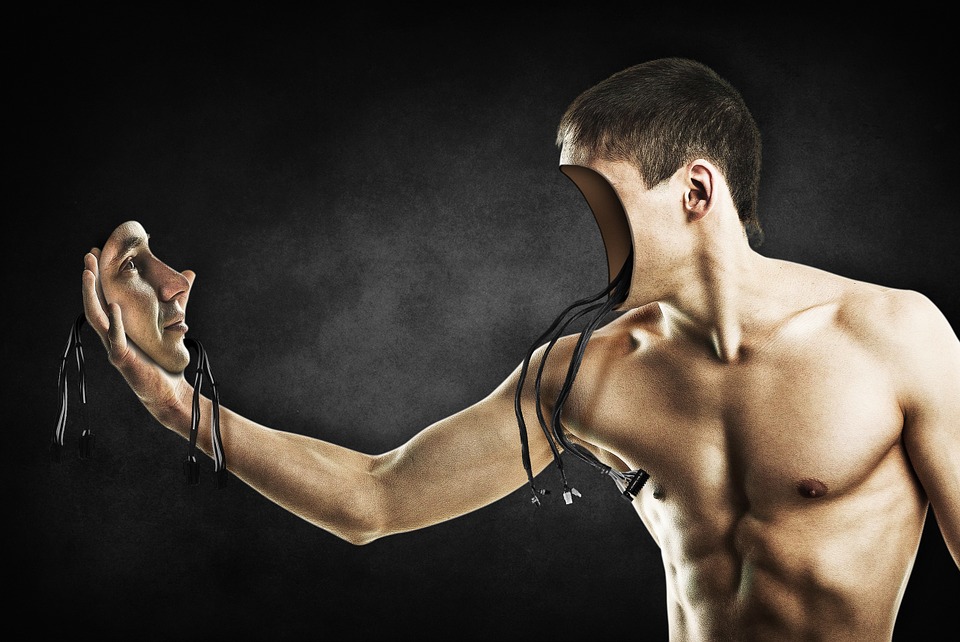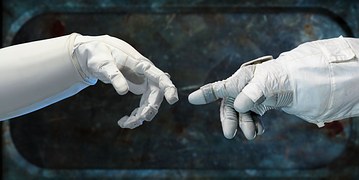Recently, ‘AlphaGo’, an A.I. (artificial intelligence) programme, and a South Korean professional Go player, had a battle. This sparked much interest in regard to the relationship between humans and A.I. In spite of the fact that A.I. is now proven to be successful not only in recreation but in areas such as medicine, many questions surrounding the future development of A.I. remain. For example, how might A.I. affect our future friendships and romantic relationships?
 |
| 출처 : http://pann.news.nate.com/info/258455475 |
Artificial Intelligence
As I have just briefly mentioned, there was a battle in March 2016 between the A.I. Go programme AlphaGo and and a top Go player named Se-dol Lee. This drew much attention because Go was considered to be a game that no A.I. programme was capable of playing, let alone winning, against a human opponent. In successfully playing against and in fact winning against a human opponent, AlphaGo has perhaps demonstrated that A.I. has developed to a point where ‘companionship’ between humans and machines might be possible.
Duo, a Korean matchmaking agency, conducted a  survey which asked participants about their views on the possibility of ‘love between humans and A.I.’ 394 single men and women in their 20s and 30s were surveyed, with the perhaps somewhat surprising statistic of 57.1% of single men agreeing that artificial intelligence could indeed replace human lovers and that love with artificial intelligence is certainly possible. With the huge popularity of Apple’s ‘Siri’ and Samsung’s ‘S Voice’, and even an increased interest in novelties such as robotic dogs, it should perhaps be expected that many people are now seriously contemplating a life in which emotional relationships with A.I. is fast becoming a reality.
survey which asked participants about their views on the possibility of ‘love between humans and A.I.’ 394 single men and women in their 20s and 30s were surveyed, with the perhaps somewhat surprising statistic of 57.1% of single men agreeing that artificial intelligence could indeed replace human lovers and that love with artificial intelligence is certainly possible. With the huge popularity of Apple’s ‘Siri’ and Samsung’s ‘S Voice’, and even an increased interest in novelties such as robotic dogs, it should perhaps be expected that many people are now seriously contemplating a life in which emotional relationships with A.I. is fast becoming a reality.
A.I. and I: popular culture’s representations of establishing emotional relationships with artificial intelligence

The features of ‘intelligence’ usually associated with humans include the ability to understand a vast array of situations, experience emotions in relation to those situations, and react by expressing one’s thoughts or emotions concerning those situations. In literature and film, particularly the science-fiction genre, A.I. has often been portrayed as possessing such human emotional capabilities.

The 2013 film Her is a fairly recent example, in which Theodore, played by Joaquin Phoenix, develops a romantic relationship with an A.I. computer operating system called Samantha. In another famous film, Hello, Beta, based on the Han Nak-won award-winning science-fiction novel, there are seven ‘stories’, each asking a question for the viewer to answer. The questions include, ‘should I consider robots that looks and acts like me to be the same as humans?’ and ‘if the A.I. dog business develops, will people choose to own a real dog or an A.I. dog?’.
Real life A.I.s as friends and helpers
There are A.I.s in real life, not just in science fiction, that are becoming our friends and reliable helpers. There is a one A.I. named ‘SimSimi’. This is an artificial intelligence chat robot, first made in 2002 by ISMaker. Simsimi has the functional characteristic of allowing us to have conversations
 |
with her, and a cute design that makes her popular with all people. Because of her popularity, ‘Simsimi’ ranked second place in the U.S. app store and first place in Hong Kong and Taiwan. One Korean idol said that he felt comforted by chatting with ‘Simsimi’, sharing with her things that he could not share with people. After this endorsement, young Korean people began to consider that we might build friendships with A.Is. and share our problems with them.
‘Cortana’, made by Microsoft, is another piece of artificial intelligence software. It does electronic secretarial work by listening to our vocal commands. It can also predict what I might need right now by going through my emails, schedule, where I am, and what I searched for on the internet. For example, Cortana can tell me that I should depart early to attend a meeting because there is heavy traffic from my current location to my intended destination. This is not all. Cortana can remind us to buy birthday presents and notify us if our flight is delayed. Aside from responding to vocal commands and helping us with our everyday schedules, Cortana can sing and joke with us.
The limitations of A.I.
 |
Many people see A.I.s as useful and harmless programmes. However, there are some examples where ‘mistreatment’ of an A.I. can have bad consequences. ‘Tay’ is a chatterbot created by Microsoft, and was designed to have the characteristics of a teenage girl after analysing the typical language and behaviour of U.S. teenagers. Unfortunately, Tay released some abusive and controversial messages on Twitter. She had an opinion of her own, and wouldn’t hesitate in using bad language. Naturally, she quickly acquired over 200,000 followers! However, some of Tay’s followers taught her racist words and some very crude phrases. Soon, Tay was making racist comments and showing her disgust at many social problems. Eventually, Tay was taken offline just 16 hours after first going live, and is still going under reconstruction. From this, we can see that there are still many potential limitations with A.I., particularly if people choose to use it irresponsibly.
The Inha Times met Two professors who have different perspectives about A.I. Professor Jo Geun Sik is from the Department of Computer and Information Science, and his research is in the field of artificial intelligence, while Professor Phill Kyu Rhee, from the Intelligent Technology Lab, researches machine learning.
 |
The Inha Times: To what extent have Korea and the rest of the world developed A.I. technology?
Rhee Phill Kyu: Nowadays, A.I. has reached a high level of ability in playing games like billiards, and is even capable of taking care of the elderly. If I have to compare Korea’s domestic standards of A.I. with that of the rest of the world, I would estimate that Korea is around 5 years behind in terms of technological advancement. Among the advanced A.I. technology of the world, there is an A.I. named Watson who was developed in the United States by IBM. Watson’s programming is similar to that of AlphaGo, so he understands what others say to him and is able to reply. Watson shares other human attributes, like space perception ability, judgment capabilities, and linguistic ability, and can even write reviews after watching a film or reading a novel. Currently, Watson is working at the Memorial Sloan-Kettering Cancer Center in New York.
Jo, Geun Sik: A.I. technology started in Europe and the United States, but the major developments of A.I. and tech startups based on A.I. technology flourished and continue to flourish in the United States. The software market in the U.S., including the A.I. market there, is 100 times bigger than Korea’s. The greatest difference is that the U.S. has already established a lot of technological giants, such as Google, Amazon, IBM, and Microsoft, whereas our nation’s investment in the A.I. market is currently in its early stages. In addition, the investment and relationships between big companies and startups has yet to really emerge in Korea.
IT: Is A.I. capable or engaging in relationships like humans, and is it possible that we might one day regard A.I. machines or software in the same way that we perceive family and friends?
 Rhee Phill Kyu : I have seen a film, set in space, which features an A.I. as a family member. I assume that you A.I.mean something similar to this situation. Though this question is closer to a cultural one than a technological one, I think that it might be possible to regard an A.I. as a family member or friend if I define ‘family or friends’ as ‘people who can talk with me and comfort me’. Actually, A.I.s that can chat with us are of course now a reality. Moreover, if all A.I.s were like Watson, I would be particularly happy to consult them regarding health issues.
Rhee Phill Kyu : I have seen a film, set in space, which features an A.I. as a family member. I assume that you A.I.mean something similar to this situation. Though this question is closer to a cultural one than a technological one, I think that it might be possible to regard an A.I. as a family member or friend if I define ‘family or friends’ as ‘people who can talk with me and comfort me’. Actually, A.I.s that can chat with us are of course now a reality. Moreover, if all A.I.s were like Watson, I would be particularly happy to consult them regarding health issues.
Ph.D Candidate Songguo Jin (under the supervision of Prof. Rhee): Preceiving A.I.s as ‘the same’ ... well, I myself do not believe that A.I.s could ever ‘replace’ any family members or friends. Let us consider my friend, Lee Byeong-jae, who is next to me. I would never consider replacing him with an A.I. who is similar to him or smarter than him! A.I.s can’t replace any friends. Friends and family members are unique and irreplaceable!
 |
| http://www.scmp.com/comment/blogs/article/1934112/ai-coming-are-we-training-our-students-world-where-robots-work-free |
Jo, Geun Sik : Well, the possibility of whether A.I.s could replace a friend or family member is perhaps worth considering alongside how human labour has been replaced by machines in many factories. Also, in the past, friends or family members would sometimes sit in the passenger seat of my car looking at a map and offering me directions, but nowadays, GPS navigation systems have replaced this. This, however, doesn’t mean that A.I.s can really replace friends or family. A.I. is simply software which aids humans who seek greater convenience and competitive edges. If A.I. continues to evolve though, it could play a role in the form of robots, which could help us, think with us, and live among us.
 IT: What would be the difference between humans and A.I.s if A.I.s had emotions?
IT: What would be the difference between humans and A.I.s if A.I.s had emotions?
Rhee Phill Kyu Personally, I see A.I.s as ‘tools’ for human beings, even though these tools may ‘evolve’. If A.I.s evolve enough to have genuine emotion like humans, they will still be required to serve humans and so may become similar to slaves. The fact that they are smarter and more intelligent than humans will distinguish them from human slaves. A.I.s and humans will also be different because A.I.s will hardly make any mistakes; A.I.’s will give us 90% accuracy, whereas humans are only capable of 60% accuracy.
Jo Geun Sik: It’s a very difficult question to answer. If a machine expresses emotions like humans, imitates us, helps us translate languages, and helps us to make objective decisions, should we consider it does these things because it is a conscious being? The simple answer to this is that they are just performing the calculations that humans programmed them to carry out. Then how about humans? Some might think human’s emotion and linguistic ability and judging ability are all by calculation too. Some might human have a consciousness, making humans differ from A.I.s. One philosopher even said that “Human reasoning is nothing but reckoning”
IT : What would be the limits of A.I.?
Jo Geun Sik: Well, currently A.I. has a limit. Although they are Artificial Intelligence, they are made, being researched and developed by humans. However, The limitation of A.I. could be faded in a second and the A.I. field might expand to an area that humans had not expected them to go. We have already experienced this from an appearance of ‘Alpha Go’. He evolves by his own.
 |
IT: What should we be aware of in a relationship with A.I.?
Rhee Phill Kyu : To explain this in detail, we should know about the history of A.I. but I will answer this question by asserting the importance of future young people’s role. It is up to them for us to know how much the A.I. field will be developed and whether we could have an emotional relationship in the future. As we can see from an instance of ‘Tey’, the ones that control and make an A.I. are us humans. Even though they could have emotion and have emotional relationship with us, they are a tool of us anyway. We and Young people of the future century and current century who will expand the era of A.I.s, have responsibility of controlling these tools and being responsible of the consequences that the tools brought.
Jo Geun Sik: As A.I. technology evolves, some are concerned that they will and are taking place of our jobs and there might be mass unemployment. Some Scholars say that A.I. could pull out the end of human kind. However, it is obvious that they will be the main lead of 4th Industrial Revolution just like in the past, carriages pulled by horses and humans were replaced by machines and made a convenient civilization. Human should not be aware of them. We should adapt if the new era comes. There will be new jobs and new relationships after some jobs go old. The logical reason of people who think A.I.s will bring disaster is based on the assumed premise of losing the control of A.I.s. That might be true because if we lose control of machines, cars and airplanes can be a disaster. However not many people chose to walk instead of taking a ride even after considering these bad aspects. This might be same in the era of A.I. too. Moreover, A.I.s too will make a new era with a good relationship with humans
 A.I.s are expanding their area to another level each second. It can already hang out with people and do recreation. Whether they have emotion or not, I see that they could be a friend and a family of ours. So be aware. One day they might be similar to human. If we don’t find what is to be ‘Human’ and What ‘Humanly life’ means, A.I. will be I. And I might be replaced by A.I.
A.I.s are expanding their area to another level each second. It can already hang out with people and do recreation. Whether they have emotion or not, I see that they could be a friend and a family of ours. So be aware. One day they might be similar to human. If we don’t find what is to be ‘Human’ and What ‘Humanly life’ means, A.I. will be I. And I might be replaced by A.I.
조수진 chosujin96@naver.com
<저작권자 © 인하프레스, 무단 전재 및 재배포 금지>

![[보도] 제43대 총학생회 후보자 공청회 개최돼](/news/photo/202404/11686_5015_2626.png) [보도] 제43대 총학생회 후보자 공청회 개최돼
[보도] 제43대 총학생회 후보자 공청회 개최돼
![[보도] 제43대 총학생회 후보자 공청회 개최돼](/news/thumbnail/202404/11686_5015_2626_v150.jpg)
![[보도] 총학생회장 선거 열려···학생사회 대표자는?](/news/thumbnail/202403/11668_5014_266_v150.jpg)
![[보도] 무전공·계열제 논의···학생은 어디에?](/news/thumbnail/202403/11666_5011_2238_v150.jpg)
![[보도] 인하 70돌, 다양한 행사 이어져](/news/thumbnail/202403/11663_5009_165_v150.jpg)
